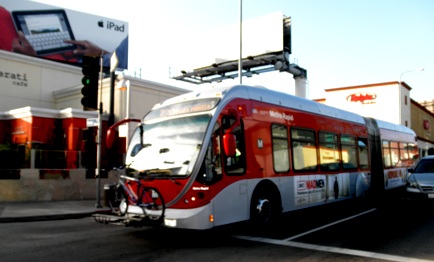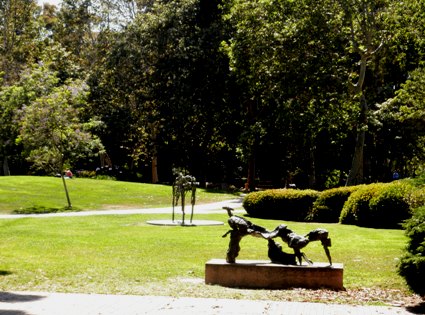
Cap a Austin, Texas

Varem marxar ja fa dos dies de Los Angeles i som ara a Austin, la capital de l’estat de Texas. Això és verdaderament un altre mon. Impossible recollir al blog tot el que anem veient, perquè correm per molts llocs i toquem mols temes (i, a més, veiem moltes coses curioses, com per exemple que molts busos urbans com el de la foto porten un porta-bicicletes plegable per portar fins a dues bicis cada viatge -dedicat a en Xavier Corominas i els membres de l’intergrup parlamentari de la bicicleta-). Del programa de Los Angeles, per exemple (LA com diuen ells), no us he parlat gens d’una visita molt interessant a l’oficina de la candidata a governadora del partit republicà. El governador Arnold Schwarzeneger no es pot tornar a presentar i qui ha guanyat les primàries del partit republicà per esser candidata a substituir-lo és Meg Whitman . Va esser molt curiosa la reunió amb els membres del seu equip. Va esser una nova lliçó sobre com la forma de plantejar-se les campanyes electorals aquí. El nivell de professionalitat que es veu en tots els equips polítics és altíssim, malgrat que compten, també, amb la col.laboració de molts voluntaris. La recaptació de fons per poder pagar, entre altres coses, aquests equips professionals, ocupa un part important del temps dels candidats i les candidates. Una cosa que ens ha quedat clara és que aquí els vots es van a buscar un a un, porta a porta, trucada a trucada. Sorpren la disponibilitat que tenen els partits de les dades personals dels ciutadans, que utilitzen amb aquesta finalitat. Entre altres coses, aquí cal registrar-se per votar i , si es vol et registres com a votant d’un o altre partit. Després els partits disposen d’aquesta dada (si la persona l’ha facilitat), i d’altres.

L’altra visita molt remarcable va esser la que varem fer a la UCLA, la Universitat de California, Los Angeles (a la foto podeu veure el “jardi d’escultures” del seu campus) i pel seu interès ens va agradar molt la reunió amb el professor de Hiroshi Motomura, especialista en temes d’immigració. En la revista de la UCLA varen fer una nota informant de la nostra visita, que podeu veure tot seguit:
Young Spanish Politicians Examine Immigration on US Tour
As part of the State Department’s “Young Political Leaders” project, five Spanish and Andorran officials share perspectives with UCLA Professor of Law Hiroshi Motomura, an expert on immigration and citizenship in the United States. Spain has seen an immigration boom in the last decade.
By Kevin Matthews
Senior Writer
A day after celebrating Spanish victory at the 2010 World Cup in South Africa, which they watched from Santa Monica, four young politicians from Spain and a fifth from the neighboring Principality of Andorra visited Bunche Hall for an exchange of perspectives with UCLA Professor of Law Hiroshi Motomura, an expert on legal and illegal immigration and evolving concepts of citizenship in the United States.
The Los Angeles leg of the officials’ two-week, State Department–sponsored trip was dedicated mainly to immigration, which in Spain has been a hot-button political issue for only about a decade. Elsewhere in the United States, they were scheduled to focus on issues such as federalism, trans-Atlantic relations and green energy. Their July 12 meeting with Motomura was arranged by the International Visitors Bureau at UCLA.
By 2000, a Spanish construction boom and an amnesty program had begun to attract unprecedented numbers of immigrants from Latin America as well as Africa and the eastern edge of the European Union. According to government figures cited in a recent Wall Street Journal article, Spain’s foreign-born population increased five-fold over the past decade to 5.7 million people, or more than 12 percent of the population. The article noted that this growth has now stalled, amid the current debt crisis and high unemployment in Spain.
“Some sectors of our society have a fantasy that these people are going to leave” now that the economic expansion is over, said Pia Bosch Codola, a member of the Catalonian autonomous region’s parliament. Bosch Codola said that the region’s more than 1 million foreigners, out of a population of 7 million, would have less access to social services including education and health care in their countries of origin than they do in Spain.
Representing their country’s two largest political parties and both coastal and landlocked provinces, the Spanish visitors asked Motomura about U.S. strategies for integrating new residents into the broader society and the practicality of securing external borders. Some expressed concerns about cultural differences with Muslim newcomers to Spain.
Yolanda Pasto Pelegri, Counselor of Finance for one of Andorra’s municipal divisions, expressed interest in ways to accommodate non-voting residents. A constitutional mandate prevents the country of 86,000 souls from extending voting rights to those who’ve lived there for less than 20 years, she said. Less than one quarter of Andorrans are eligible to decide questions about Andorra’s future, she said, though all residents enjoy equal access to social services.
Motomura, the author of Americans in Waiting: The Lost Story of Immigration and Citizenship in the United States (Oxford, 2006), illustrated changing U.S. attitudes towards immigrants with various related examples, such as the common extension of voting rights to non-citizen white Europeans in the 19th century. That contrasts with the current situation, in which it is very rare for immigrants to have a say even in local school board elections.
“In the 19th century voting was seen as a form of civic education that would help them to become Americans,” he said.
Among other current issues, Motomura discussed a “disconnect” between U.S. economic needs and the system of legal immigration. His forthcoming book will deal with illegal immigration to the United States, providing historical context for reform efforts and state-government interventions such as the Arizona law giving police broad powers to detain people who they suspect are residing in the United States illegally.
The visitors on July 12 were Pasto Pelegrini; Bosch Codola; Javier Maroto Aranzabal, an opposition party spokesperson in Vitoria, a city in Spain’s Basque region; Patricia Navarro Perez, a senator for the southern region of Andalucia; and Alfonso Serrano Sanchez-Capuchino, a member of Congress from Madrid.
The delegation’s program was sponsored by the U.S. State Department through the International Visitor Leadership Program. It was administered locally by the International Visitors Council of Los Angeles, and the itinerary at UCLA was arranged by the International Institute’s International Visitors Bureau